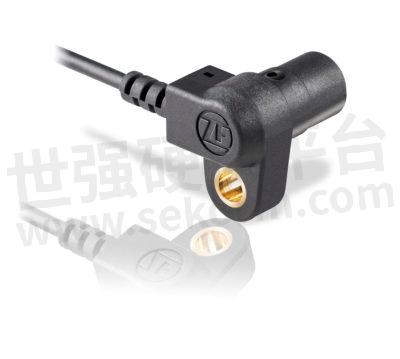ZF Increase E-Bike Speed Sensor Portfolio: GS Series, The Extremely Compact Design Meets The Necessary Requirements for The Use In E-bikes

Auerbach. With the increasing popularity and growing trend of e-bikes, bicycle system suppliers have set goals to optimize power and performance of their drive systems. In order to support the driver in the best possible way, sensors are needed to deliver the required data and therefore adapt the engine’s power support. An essential component is the ZF e-bike sensor for measuring the current speed. The ZF e-bike sensor is based on Hall technology with significant advantages over conventional reed switches.

Especially for high-quality e-bikes, all components need to be functional, from the drive to the battery and cabling. This is also the case with the ZF e-bike sensor. Speed sensors of the GS series have been specially developed for use in Pedelecs and S-Pedelecs. The extremely compact design meets the necessary requirements for the use of e-bikes. The sensors are based on the principle of Hall-effect and therefore they are non-contact and durable. In combination with ferromagnetic target wheels, a high-resolution speed measurement with over 50 pulses per revolution can be implemented without any problems. In practice, this leads to a finer and quicker response from the e-bike driver – especially at lower speeds (e.g. when starting up a hill). The differential measurement of the magnetic flux also increases the robustness of the sensor against vibrations. In addition, there is no need for an external magnet, which is used with conventional reed switches. These are frail against even slight shifts on the spoke, which leads to functional failures and shut down of the drive unit.
The GS82-AA02 is the latest addition to the ZF e-bike sensor portfolio. This sensor is significantly more compact than its predecessor (21.75mm length, 9.35mm diameter) and optimized for use in e-bikes. As an interface to the drive system, the Higo connector has a cross-section of only 0.14mm² and due to its small size is prevalent in the e-bike industry. Depending on the customer’s requirements the contact via connector, as well as the cable length, can be preselected individually. The sensor requires a constant voltage supply of 6.5 – 20 VDC and measures frequencies between 1 and 2,500 Hz. They are designed for a temperature range from -25 ℃ to + 85℃ to fulfill the declaration of conformity in the e-bike industry.
The ZF sensor was originally developed for ABS applications. In addition to e-bikes, other target markets include e-scooters and various sports equipment for this small and efficient sensor.
- +1 Like
- Add to Favorites
Recommend
- ZF Electronics New Energy Harvesting Wireless Switch as A Batteryless Alternative for Wired Micro-switches
- Modular Speed & Direction Sensors at ZF Electronics
- ZF E-Bike Speed Sensor GS Series with Speed Disc Offers Considerable Benefits with Regards to the Functional Safety
- ZF Product Insight – The KNX Light Switch Module
- Successful Energy Harvesting by ZF
- ZF’s KNX-RF Switch Module Allows for Flexibility
- Traffic Sign Control by Energy Harvesting Switches
- The ZF E-bike Speed Sensor Enriches the New Trend of ABS Applications
This document is provided by Sekorm Platform for VIP exclusive service. The copyright is owned by Sekorm. Without authorization, any medias, websites or individual are not allowed to reprint. When authorizing the reprint, the link of www.sekorm.com must be indicated.





























































































































































































































































































































































































































































































































































































































































































































































































































































































